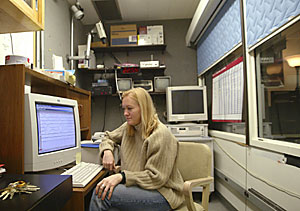 |
|
KEVIN B. KLAUS/Arizona Daily Wildcat
|
Psychology doctoral candidate Willoughby Britton studies brain wave patterns at the Sleep Research laboratory in the Psychology building yesterday afternoon.
|
|
|
By Georgeanne Barett
Arizona Daily Wildcat
Wednesday, November 24, 2004
Print this
For those who have difficulty sleeping, nights can be endless and mornings painful, but the UA sleep research lab students and professors are constantly working to find help for those who need more sleep.
Professor Richard Bootzin, who founded the UA Sleep Research Lab in 1987, said over the years he has conducted many types of research on different aspects of sleep.
Bootzin said he started the lab to try to answer many of the questions that are out there about sleep.
"There is always something we don't know about sleep," Bootzin said. "It's a fascinating area to study. There are lots of questions to always be answered."
Bootzin said a study on the sleep patterns of adolescents who had been in substance abuse programs was recently finished.
"We wanted to teach them to sleep better," Bootzin said. "The substance itself, or withdrawals, can cause sleep problems. We wanted to devise a group treatment to help these individuals."
Bootzin said in this particular study, the sleep lab helped adolescents sleep better through group therapy and by studying their sleep patterns.
Bootzin said he is unsure if the study will help prevent future drug use in the adolescents.
"The outcome looks good, we just don't have enough data to tell yet," Bootzin said.
The sleep research lab is for research purposes only and does not admit patients. Instead, participants from the community volunteer for the studies.
Bootzin said participants in the adolescent study stayed in the lab overnight for observation and kept diaries about their experiences.
The study was funded by the Office of National Drug Control Policy, which is part of the executive office of the President that establishes policies, priorities, and objectives for the nation's drug control program.
The sleep lab has also studied long-term insomnia, and studies are being conducted by doctoral students on different aspects of sleep and brain waves.
Bootzin said undergraduate and graduate students work in the lab along with paid and unpaid research assistants and students doing independent study work.
Willoughby Britton, a psychology doctoral student, has worked at the sleep lab for six years.
She said she did a study on the brainwaves of people with near-death experiences, and is working on a study about the effects of meditation on the brain.
Britton said it was fairly easy to find participants for her research on the near-death experiences study.
"There is a near-death experience support group where I was able to find candidates," Britton said. "This is a religious experience for people and I was looking to find unusual waves in the temporal lobe."
Britton was able to conclude through her research that there were unusual brain waves in participants with near-death experiences.
For the study Britton is working on, she said she is still looking for people between the ages of 18 and 60 who are interested in participating.
Bootzin said the sleep lab, which is in the psychology building, is equipped with a control room, an office, set-up spaces for the studies and two bedrooms where participants' sleep patterns and brain waves can be measured.
Brant Hasler, a clinical psychology doctoral student, has also done research and work on many of the different studies in the sleep lab.
Hasler said at a given time, there are usually two or three studies going on.
For people interested in participating in the study on the effects of meditation on the brain, contact Willoughby Britton at the UA sleep research lab at 621-5127.
